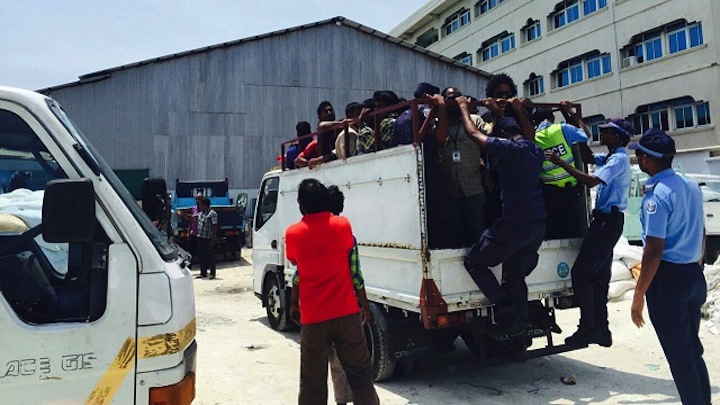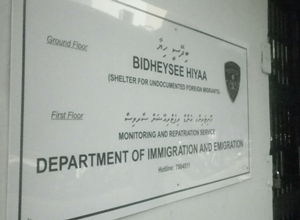The government has launched today a five year strategic action plan to prevent human trafficking in Maldives, but the ministry of economic development did not disclose details of the plan.
“There will be no room for human trafficking in the Maldives. The government of President Adbulla Yameen will close all the doors open to human trafficking,” foreign minister Dunya Maumoon said at a ceremony this morning.
The action plan will improve the legal framework set by the Anti-Human Trafficking Act of 2013 by “implementing the anti-human trafficking law and putting together policies to prevent people from human trafficking,” she said.
A government report in 2011 revealed human trafficking to be the Maldives second most lucrative industry after tourism – worth an estimated US$123 million a year. The US state department said foreign workers in the Maldives experience forced labor, including fraudulent recruitment, confiscation of identity and travel documents, withholding or nonpayment of wages, and debt bondage.
With the Anti-Human Trafficking Act, the Maldives avoided last year a downgrade to the state department’s lowest tier on human trafficking and possible non-humanitarian and non-trade sanctions.
In March, the government prevented foreign workers from holding a protest over a spate of fatal stabbings.
The immigration department last week said 1,953 undocumented foreign workers were identified and deported in 12 operations conducted in 2015. More than 8,800 undocumented workers were deported last year.
Economic minister Mohamed Saeed, who is the chair of the steering committee on preventing human trafficking, assured today that the government will stop abuse of foreign workers: “We cannot traffic humans. It is an inhumane act. The government of Maldives will do everything to stop it from happening. The labour industry of Maldives should not be abused. The economy of Maldives will set examples to Asia for setting exemplary standards in the labour industry.”
Minivan News requested the economic ministry for details of the plan, but it was not available at the time of going to press.
Meanwhile, commissioner of police Hussein Waheed said the police had investigated eight cases of human trafficking since the anti-trafficking law came into force.
“We have also busted a foreign human trafficking network that was openly engaging in the crime, and have deported the foreigners involved. We are also investigating the cases of Maldivians who were part of it,” he said.
The state department report, released in June 2014, said the Maldivian authorities had not prosecuted any recruiting agencies for fraudulent recruitment practices. Some victims were penalized for offences committed as a result of being trafficked, while thousands were deported without adequately screening for indications of forced labor.
But the Maldives had opened its first shelter for trafficking victims, distributed pamphlets about rights to migrant workers in a number of other languages, and blacklisted some companies for fraudulent recruitment practices.
Police and other officials require training on trafficking, and procedures to identify victims and refer them to protective services, the report said.

